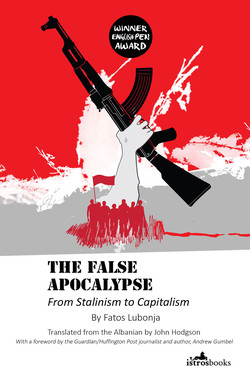Читать книгу The False Apocalypse - Fatos Lubonja - Страница 10
На сайте Литреса книга снята с продажи.
ОглавлениеChapter IV
Facing the Unknown
‘Shocking Under Dictatorship, Shocking in Freedom’ was Qorri’s headline in Koha Jonë on 24th January, above the photo of Edi Rama’s bloodied face. ‘Men in black hoods with iron bars and knuckledusters carried out a barbarous attack on Edi Rama and his friend Vladimir Myrtezaj, the painter and lecturer at the Academy of Arts...’
The article tried to convey the public outrage, not only at the attack on two artists and intellectuals but at the national crisis caused by the collapse of the pyramids. ‘People are anxious to see how the political parties will find a way out of the impasse into which they have driven the country. The barbarous attack on Rama and Myrtezaj shows that the government has opted for the path that has led Albanians throughout history to kill each other.
In conclusion, Qorri mentioned a letter that he and a group of inmates had sent from prison to Sali Berisha at the beginning of the ‘90s, in which he mentioned the proverb, ‘Eyes see better after tears.’ ‘I hoped that he too would be among those who had wept. But Sali Berisha seems never to have shed a tear in the last few years. God help him!’
At the end of that bitterly cold January, the hostility between the government and the opposition reached a new pitch. Berisha had every faith in the Albanians’ atavistic fear of the State. Down the generations, they had learned to be scared of three things: fire, water, and the State. Under communism this fear had seeped into their very marrow. The opposition still trusted that they would not be as frightened as before, because Albania had opened up and they could not so easily be ruled by violence as they had been in the past.
Both sides were venturing into unknown territory.
The future was ever more unpredictable because of the appearance of another protagonist on the stage, whose strength nobody could assess: the furious mob of people who had lost their money in the pyramids, and whose fear had evaporated at the same time as their dreams of wealth. Recently, when the police forces charged the protesters to disperse them, they had for the first time come up against a hail of stones, along with an overturned, blazing police car.
Albanian Television’s dramatic report pointed out the danger to society posed by these people and warned that the State would use all possible means to maintain order.
***
The winter cold did nothing to cool these passions, and these increasing acts of violence were a dangerous omen.
Several days after the attack on Rama and Myrtezaj, Qorri sat down to draft a memorandum for which he hoped to gather as many well-known signatures as possible.
It was time for Albania’s intellectuals to state some blunt truths. The great financial deception was only part of an even greater political deception. Within a few years, the Democratic Party had transformed itself from a hope to a threat. Abandoned by its intellectual supporters, it was now a rump of ex-communists who had now turned into anti-communists, with a contingent of former victims of persecution who allowed themselves to be manipulated by a state that was crushing the first green shoots of democracy.
The stone throwing and fires were not just because people were furious at losing their money but also because their patience had been abused. They had seen the government first behave like a bandit and then set itself up as a judge. Any people who were not allowed to demonstrate peacefully would one day resort to using stones and fire. The country needed an authority based on trust not fear, and this could only come from a parliament elected by a free vote. The traditional destructive cycle of ‘crime breeding crime’ had to be broken.
Qorri’s memorandum in this spirit was addressed to President Berisha and his party but also to the opposition, calling on them to rise above power struggles and to construct an alternative. It called on the army and the police not to allow themselves to become instruments of one political group against another, and it appealed to the whole of public opinion. Copies were sent to the embassies in Tirana. In conclusion, he appealed to people to continue their peaceful protests, avoiding outbreaks of violence and ignoring the provocations of the secret police.
The number of signatures was not large. What Qorri in one of his articles had called the ‘pilot fish’ (a large category of the former communist intelligentsia) were frightened. Fish of this kind have no fins to steer themselves, so in compensation nature has given them very strong lips. They clamp these lips onto sharks that carry them along until they find a pocket of warm water where they can float. These fish had now torn their lips away from Berisha, because he had left the warm waters. But he was still strong enough to punish them. So they had not attached their lips to a new host. They were biding their time.
And so there were barely sixteen signatories. Besides Qorri, they included four former political prisoners and Kurt Kola, the chairman of the Association of Former Political prisoners, and Daut Gumeni, Qorri’s neighbour in Kindergarten Nr. 19. There was also the theatre producer Ben Kumbaro, as well as Edi Rama, and Artan Imami, who had been at the table that dramatic evening at Noel’s.
The memorandum was published in Koha Jonë.
